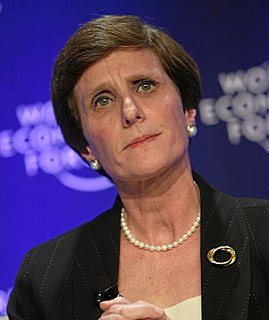A Quote by Blake Mycoskie
Giving feels good, but it's also good for the bottom line. Charity is a viable growth strategy for a lot of companies. Our customers get excited to be a part of what we're doing. If you ask anyone wearing Toms how they first heard about us, most won't mention an advertisement; they'll say a friend told them our story.
Related Quotes
Somebody once told me, ‘Manage the top line, and the bottom line will follow.’ What's the top line? It's things like, why are we doing this in the first place? What's our strategy? What are customers saying? How responsive are we? Do we have the best products and the best people? Those are the kind of questions you have to focus on.
Now the Japanese companies are more focused on that. To have two independent directors - I think it's good to have outside people look at you and think of what you could be doing better. Those are voluntary, but most of the companies told me they're going to do it. And I think it's good for them to say our returns on equity, for example, should be higher. Also, I think some could be more ambitious.
Too many writers think that all you need to do is write well-but that's only part of what a good book is. Above all, a good book tells a good story. Focus on the story first. Ask yourself, 'Will other people find this story so interesting that they will tell others about it?' Remember: A bestselling book usually follows a simple rule, 'It's a wonderful story, wonderfully told'; not, 'It's a wonderfully told story.'
But we can also ask for something we are much more likely to get, and that is to find a person or two, somewhere in our travels, who will tell us that we are noble enough, whether it is true or not. We can ask for someone who will say, “You are noble enough,” and remind us of our good qualities when we have forgotten them, or cast them into doubt.
The fact that used cars is our largest category is a good example. We would not have sat in a conference room and said, "Hey, how about used cars?" So what can be learned that is extensible to other companies is to ask what are your customers doing with your products that maybe you didn't anticipate that they would do? How do you think of your customers as your research and development lab, as opposed to having an R&D lab at headquarters?
People always ask us women about how we balance our lives. Rarely do they ever ask men this but we are asked this and it makes a lot of sense - balance, right? It sounds right. And of course you do have to balance because otherwise you'd go crazy. And you do have to find ways of doing things in a sensible manner, raising children and all those choices. But then there's a part of creativity which is irrational and which is obsessive and then that's also part of what we do. So, I don't think that's a bad thing. I think that's part of what makes someone good.
A necessary part of our intelligence is on the line as the oral tradition becomes less and less important. There was a time throughout our land when it was common for stories to be told and retold, a most valuable exercise, for the story retold is the story reexamined over and over again at different levels of intellectual and emotional growth.
When we honestly ask ourselves which person in our lives mean the most to us, we often find that it is those who, instead of giving advice, solutions, or cures, have chosen rather to share our pain and touch our wounds with a warm and tender hand. The friend who can be silent with us in a moment of despair or confusion, who can stay with us in an hour of grief and bereavement, who can tolerate not knowing, not curing, not healing and face with us the reality of our powerlessness, that is a friend who cares.
When we want to help the poor, we usually offer them charity. Most often we use charity to avoid recognizing the problem and finding the solution for it. Charity becomes a way to shrug off our responsibility. But charity is no solution to poverty. Charity only perpetuates poverty by taking the initiative away from the poor. Charity allows us to go ahead with our own lives without worrying about the lives of the poor. Charity appeases our consciences.
To build and sustain brands people love and trust, one must focus-not only on today but also on tomorrow. It's not easy...but balancing the short and long term is key to delivering sustainable, profitable growth-growth that is good for our shareholders but also good for our consumers, our employees, our business partners, the communities where we live and work, and the planet we inhabit
How often do we tell our own life story? How often do we adjust, embellish, make sly cuts? And the longer life goes on, the fewer are those around to challenge our account, to remind us that our life is not our life, merely the story we have told about our life. Told to others, but — mainly — to ourselves.
As I travel through my country, people often ask me how it feels to have been imprisoned in my home -first for six years, then for 19 months. How could I stand the separation from family and friends? It is ironic, I say, that in an authoritarian state it is only the prisoner of conscience who is genuinely free. Yes, we have given up our right to a normal life. But we have stayed true to that most precious part of our humanity-our conscience.

































